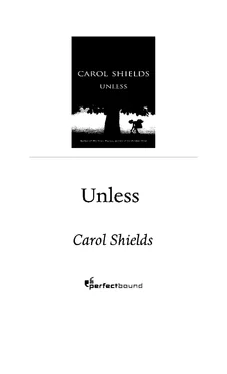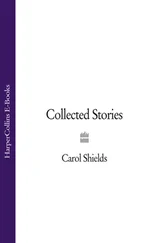Carol Shields - Unless
Здесь есть возможность читать онлайн «Carol Shields - Unless» — ознакомительный отрывок электронной книги совершенно бесплатно, а после прочтения отрывка купить полную версию. В некоторых случаях можно слушать аудио, скачать через торрент в формате fb2 и присутствует краткое содержание. Жанр: Современная проза, на английском языке. Описание произведения, (предисловие) а так же отзывы посетителей доступны на портале библиотеки ЛибКат.
- Название:Unless
- Автор:
- Жанр:
- Год:неизвестен
- ISBN:нет данных
- Рейтинг книги:4 / 5. Голосов: 1
-
Избранное:Добавить в избранное
- Отзывы:
-
Ваша оценка:
- 80
- 1
- 2
- 3
- 4
- 5
Unless: краткое содержание, описание и аннотация
Предлагаем к чтению аннотацию, описание, краткое содержание или предисловие (зависит от того, что написал сам автор книги «Unless»). Если вы не нашли необходимую информацию о книге — напишите в комментариях, мы постараемся отыскать её.
Unless — читать онлайн ознакомительный отрывок
Ниже представлен текст книги, разбитый по страницам. Система сохранения места последней прочитанной страницы, позволяет с удобством читать онлайн бесплатно книгу «Unless», без необходимости каждый раз заново искать на чём Вы остановились. Поставьте закладку, и сможете в любой момент перейти на страницу, на которой закончили чтение.
Интервал:
Закладка:
E=mc2. Energy equals mass times the speed of light, squared. The tidiness of the equation raised my immediate suspicion. How can mass — this solid oak dining table, for instance — have any connection with how fast light travels? They’re two different things. Colin, who is a physicist, was patient with my objections. He took the linen napkin from his lap and stretched it taut across the top of his coffee cup. Then he took a cherry from the fruit bowl and placed it on the napkin, creating a small dimple. He tipped the cup slightly so that the cherry rotated around the surface of the napkin. He spoke of energy and mass, but already I had lost a critical filament of the argument. I worried slightly about his coffee sloshing up onto the napkin and staining it, and thought how seldom in the last few years I had bothered with cloth napkins. Nobody, except maybe Danielle Westerman, does real napkins anymore; it was understood that modern professional women had better things to do with their time than launder linen.
By now I had forgotten completely what the cherry (more than four dollars a pound) represented and what the little dimple was supposed to be. Colin talked on and on, and Tom, who is a family physician and has a broad scientific background, seemed to be following; at least he was nodding his head appropriately. My mother-in-law, Lois, had politely excused herself and returned to her house next door; she would never miss the ten-o’clock news; her watching of the ten-o’clock news helps the country of Canada to go forward. Christine and Natalie had long since drifted from the table, and I could hear the buzz and burst of TV noises in the den.
Pet, our golden retriever, parked his shaggy self under the table, his whole dog body humming away against my foot. Sometimes, in his dreams, he groans and sometimes he chortles with happiness. I found myself thinking about Marietta, Colin’s wife, who had packed her bags a few months ago and moved to Calgary to be with another man. She claimed Colin was too wrapped up in his research and teaching to be a true partner. A beautiful woman with a neck like a plant stem, she hinted that there had been a collapse of passion in their marriage. She had left suddenly, coldly; he had been shocked; he had had no idea, he told us in the early days, that she had been unhappy all these years, but he found her diaries in a desk drawer and read them, sick with realization that a gulf of misunderstanding separated them.
Why would a woman leave such personal diaries behind? To punish, to hurt, of course.
Colin, for the most part a decent, kind-hearted man, used to address her in a dry, admonitory way, as though she were a graduate student instead of his wife. “Don’t tell me this is processed cheese,” he asked her once when we were having dinner at their house. Another time: “This coffee is undrinkable.” He loved pleasure — he was that kind of man — and took it for granted and couldn’t help his little yelps of outrage when pleasure failed. You could call him an innocent in his expectations, almost naive on this particular August evening. It was as though he were alone in a vaulted chamber echoing with immensities, while Tom and I stood attendance just outside the door, catching the overflow, the odd glimpse of his skewed but calm brilliance. Even the little pockets under his eyes were phlegmatic. He was not a shallow person, but perhaps he suspected that we were. I had to stop myself interrupting with a joke. I often do this, I’m afraid: ask for an explanation and then drift off into my own thoughts.
How could he now be sitting at our table so calmly, toying with cherries and coffee cups and rolling the edge of his straw placemat, and pressing this heft of information on us? It was close to midnight; he had an hour’s drive ahead of him. What did the theory of relativity really matter to his ongoing life? Colin, with his small specs and trim moustache, was at ease with big ideas like relativity. As a theory, relativity worked, it held all sorts of important “concepts” together with its precision and elegance. Think of glue lavishly applied, he said helpfully about relativity; think of the power of the shrewd guess. Such a sweeping perspective had been visionary at the beginning, but had been assessed and reinforced, and it was, moreover, Colin was now insisting, useful. In the face of life’s uncertainties, relativity’s weight could be assumed and then set aside, part of the package of consciousness.
He finished awkwardly, sat back in his chair with his two long arms extended. “So!”
That’s it, he seemed to say, or that’s as much as I can do to simplify and explain so brilliant an idea. He glanced at his watch, then sat back again, exhausted, pleased with himself. He wore a well-pressed cotton shirt with blue and yellow stripes, neatly tucked into his black jeans. He has no interest in clothes. This shirt must go back to his married days, chosen for him, ironed for him by Marietta herself and put on a hanger, perhaps a summer ago.
The theory of relativity would not bring Colin’s wife hurrying back to the old stone house on Oriole Parkway. It would not bring my daughter Norah home from the corner of Bathurst and Bloor, or the Promise Hostel where she beds at night. Tom and I followed her one day; we had to know how she managed, whether she was safe. The weather would be turning cold soon. How does she bear it? Cold concrete. Dirt. Uncombed hair.
“Would you say,” I asked Colin — I had not spoken for several minutes — “that the theory of relativity has reduced the weight of goodness and depravity in the world?”
He stared at me. “Relativity has no moral position. None whatever.” (“This coffee is undrinkable.”)
I looked to Tom for support, but he was gazing with his mild eyes at the ceiling, smiling. I knew that smile.
“But isn’t it possible,” I said to Colin, “to think that goodness, or virtue if you like, could be a wave or particle of energy?”
“No,” he said. “No, it is not possible.”
I made an abrupt move to clear the table. I was suddenly exhausted.
Still, I am thankful for the friendship and intellectual ardour of such an unpretentious man as Colin Glass, who despite his suffering and shame really wanted me to understand a key concept of the twentieth century. Or was he simply diverting himself for an hour? This is what I must learn: the art of diversion. He said not one word about Marietta all evening long.
Tom and I understand that he is reconstructing his life without her. But a daughter is something different. A daughter of nineteen cannot be erased.
Once
It was understood that I would do the publicity, such as it was, for Danielle Westerman’s third volume of memoirs. At eighty-five she was too old, and too distinguished, to handle a day of interviews in Toronto, even though she lives there. I, as the translator, could easily field questions from the press. A very light schedule was organized by the publisher, since Dr.
Wester-man already possesses a long twilight of faithful readership.
In early September, I drove into Orangetown, down its calm, old-fashioned main street and into the countryside again. The city of Toronto, monumental and lonely, glowed in front of me. Its outskirts are ragged, though its numbered exits pretend at a kind of order. Traffic was light. I drove slowly by the corner of Bloor and Bathurst for a glimpse of Norah. There she was, as always, on the northeast corner, seated on the ground near the subway entrance with her bowl and cardboard sign, even though it was not yet nine o’clock. Had she had breakfast?
Did she have nits in her hair? What is she thinking, or is her mind a great blank?
I parked the car and walked over to where she was. “Hello, darling Norah,” I said, setting down a plastic bag of food: bread and cheese, fruit and raw vegetables. And, in an envelope, a recent photo of Pet with his straight, proud muzzle and furry ruff. Norah, of all the girls, doted on Pet, and now I was bribing her shamelessly. It was a chilly day, and it iced my heart to see her unreadable immobility, but I was glad to notice that she was wearing warm mittens. Glad?
Читать дальшеИнтервал:
Закладка:
Похожие книги на «Unless»
Представляем Вашему вниманию похожие книги на «Unless» списком для выбора. Мы отобрали схожую по названию и смыслу литературу в надежде предоставить читателям больше вариантов отыскать новые, интересные, ещё непрочитанные произведения.
Обсуждение, отзывы о книге «Unless» и просто собственные мнения читателей. Оставьте ваши комментарии, напишите, что Вы думаете о произведении, его смысле или главных героях. Укажите что конкретно понравилось, а что нет, и почему Вы так считаете.












